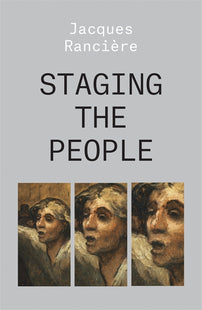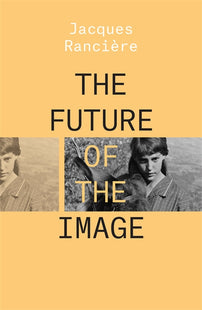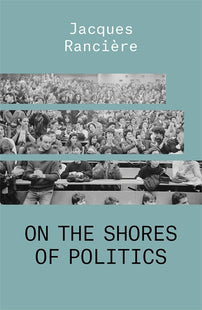“I don’t expect anything from the coming election”: Interview with Jacques Rancière by Véronique Radier
For Jacques Rancière, the future of anti-capitalist resistance lies in the proliferation and expansion of autonomous democratic movements like the gilets jaunes in France, Occupy Wall Street in the US, and the indignados in Madrid. In this interview, he explains why only authentically egalitarian movements can transform today's society.

** This interview was originally published in L’Obs on 16 January 2022.
After the fall of the Berlin Wall and the collapse of the Soviet Union, many believed in the solid triumph of the democracies. Jacques Rancière, an influential philosopher in both France and the United States, was quick to see the flaws and dangers of the new world order. An original mind, a former student of Althusser and militant with the Gauche Prolétarienne, he now works on the articulation of art, politics and the idea of emancipation. A defender of ‘those who are nothing’, this week he publishes Les Trente Inglorieuses, a collection of his interventions in politics from 1991 to 2021. From the Gulf War to the current pandemic via the ‘gilets jaunes’, he dissects our inegalitarian impulses and speaks out against the discrediting of social struggles and emancipation movements.
Do you still think it possible to hope that the presidential election will have a positive result, one way or another?
I don’t see how it could. First of all, the election of a president of the Republic is not a democratic institution; it was invented by the monarchists in 1848 to counteract popular power. De Gaulle re-established it in 1962, to republicanise the royalist concept: a single individual concentrating public power and supposed to serve as a guide for the whole community. This simulacrum of democracy ended up becoming a weapon against any truly emancipatory movement. Look at how, in 2017, the energy of Nuit Debout was swept away by the bulldozer of the electoral machine. 2022 is shaping up to be a new episode in the comedy already played out in 2002 and 2017, when the virtuous left called people to vote for the candidate of the ‘reasonable’ right to block the racist far right. I opposed this so-called logic of the lesser evil from the outset, and showed that it leads, in reality, to the strengthening of the far right. The latter has much more weight today than it did twenty years ago, and its ideas have an ever widening hold on the so-called republican right, which is no longer very different from it, and on a socialist left that is no longer very different from the right either.
Why do you think that rallying around a candidate in the name of the ‘republican front’ only encourages ideas that are contrary to the ideal of the Republic?
Twenty-five years ago, I published ‘Seven rules to help the spread of racist ideas in France’. In it I showed how indignant denunciations of the far right only strengthen it by popularising its ideas, giving them the irresistible scent of scandal and the palm of martyrdom. I can see that nothing has changed. In fact, racist and xenophobic ideas are almost the only ones debated in this campaign. And the so-called republican ideal brandished by the supporters of the ‘republican front’ has itself become identitarian and intolerant, as we can see with the forced instrumentalisation of secularism, diverted from its historical meaning to become a means of stigmatising a part of the population. This is a real spiral of radicalisation. During the 2017 presidential election, I wrote in your pages that, in 2022, we would be called on to vote for the good republican Marine Le Pen against her extremist niece Marion Maréchal. Aren’t we there today, but with Éric Zemmour? I don’t expect anything from the coming election, except the confirmation of this deleterious mechanism that confers the role of bulwark against the far right on a political class increasingly won round to its ideas.
Why do you see Emmanuel Macron as the figure par excellence of the pyromaniac firefighter?
Having no ideological background himself, not belonging to any of the traditional political families, Emmanuel Macron is nothing but an upstart. As a result, he is someone who can manipulate ideas as he pleases, a character who is in a way absolutely blank. He can solemnly present himself as a bulwark of the Republic, while delegating to his minister of education the task of making the fight against Islamo-leftism the greatest emergency in our universities, or to his minister of the interior that of thundering against the flow of immigration. He represents a kind of condensed version of the circulation and treatment of ideas in a political class where the distance between the right and the far right is shrinking at the same speed as that between left and right.
Not yet an official candidate, Emmanuel Macron has so far only announced an ‘indispensable’ pension reform in his future programme. Why do you think this is?
Breaking up the pay-as-you-go system based on solidarity and replacing it with individual private insurance is one of the major objectives of absolutist capitalism. It combines a practical aim: to reduce public spending – even if it is very hard to say how much money would really be saved – with a highly symbolic objective. Our pension system bears witness to a time when there was an organisation of life based on solidarity, which gave ordinary people the ability to manage the relationship between work and personal time. The destruction of all forms of social solidarity and, at the same time, of the structures and places of deliberation where workers’ representatives took part, responds to a fundamental challenge in a capitalist logic which, in the guise of fighting against the ‘welfare state’, establishes a direct face-to-face relationship between the state and entirely isolated individuals.
Which party or project do you think is capable of formulating an alternative to this capitalist project, which in your opinion unites most of the current political spectrum?
The idea of such an alternative has long been linked to the Marxist tradition. Even if the so-called socialist or communist states betrayed all their promises of emancipation, the Marxist vision of history remained alive. It was supported by the existence of a powerful working class, which was at once a social group, a fighting force and a form of prefiguration of a world to come. The left still largely shared this vision of history, in which capitalism produced the class destined to destroy it. But the opposite has happened: capitalism has destroyed the working class. The disappearance of the industrial base in the rich countries, with factory closures and relocations, was not only a way of making labour and commodities cheaper. It also swept away the working class as such, with its potential for struggle and forms of solidarity, replacing it with a pool of dispersed and precarious workers, alone and powerless against finance capital. The important popular movements of democratic self-assertion that have taken place, such as the movements in the squares, the ‘indignados’ of Madrid, Occupy Wall Street, Nuit Debout or the ‘gilets jaunes’, can no longer rely on this determined social force, or on a historical vision that brings hope.
[book-strip index="1" style="display"]Can’t ecology represent this new perspective, assembling people around common goods and objectives?
Rather than opening up a new horizon of hope, ecology presents us with an imminent catastrophe. To the ‘there is no alternative’ of capitalist necessity, hammered into us by our governments, it opposes another logic of urgent necessity: the race to save the planet. We are told this is the only thing to do. But the question is: who will do it? Most environmentalist discourses want to overcome the old political divisions by stating the conditions for the planet’s survival, but, in this way, they short-circuit the question of the political subject: what fighting forces, what forms of struggle can make ecology the cause of all and not that of experts who rely on the goodwill of the masters of the world?
Yet those fighting for the climate also denounce inequalities, seeing the rich as causing most of the greenhouse gas emissions. Don’t the environmental and the social cause go hand in hand?
We can say that capitalism is responsible for the ecological disaster just as it is for economic exploitation and social inequality. But indicating a common cause for all evils does not in itself produce any good. And denouncing inequality till the cows come home does not advance this cause one inch. Only the development of truly egalitarian movements can change things. You can always call on the G20 leaders to save the Amazon, but only the people who live there are really fighting to defend it. They are fighting to save it, but also to show the world that they are perfectly capable of understanding global warming or biodiversity. Equality only advances when those deemed incapable of dealing with world affairs tackle these for themselves. Besides, the continual demonstration of injustice ends up being an integral part of the unequal order.
How can we get out of this paralysing logic?
I see no other way than the extension of these autonomous democratic movements. The capitalist international is extraordinarily efficient; will we be able to form an ‘international of egalitarian movements’ to respond to it? Basically, nothing really separates the great powers of today, the United States, China, Russia or Europe, in their conception of the world, apart from the defence of their own interests, the struggle for their power. But there are still people everywhere who oppose and rebel, whether they are the demonstrators in Santiago or Hong Kong, landless peasants in Brazil or farmers opposed to the Notre-Dame-des-Landes airport project. And new forms of resistance are being invented. Think, for example, of the way #MeToo has created an effective mode of struggle against forms of violence that remained buried in the realm of private life.
But why hasn’t a movement like the ‘gilets jaunes’, for example, caught on?
The ‘gilets jaunes’ have shown us how people who are supposed to be afraid to move and be only concerned about their own affairs can start doing exactly the opposite. They came together and invented unexpected forms of mobilisation, showing that the capacity to think and act as equals does exist in all of us, even though the system seems to condemn us to isolation. When we are driven by the prospect of a more liveable world, we can give up what we have and even put ourselves at risk. The potential for expansion was very strong at the beginning of this movement. In Paris, in the street outside my house, secondary-school children started to put up little symbolic barricades. The government brutally repressed this and, more generally, made it dangerous to demonstrate in the street. But, in my opinion, what explains the slowing down of the movement is not so much this repression and the fear it can inspire, but rather the impossibility of believing in a world where we live differently.
But isn’t it also the case that we enjoy both new comforts and greater personal freedoms in today’s society?
These freedoms, where they exist, are not the result of the synchronous development we used to call progress, where the production of techniques, consumer goods and personal freedoms seemed to advance at the same pace. They were won by fighting against repressive forces. In 1968, society was no less hierarchical than it is today, but back then people felt equal and acted accordingly. Rising living standards and technological advances have not prevented the perpetuation of rape culture and all the forms of domination suffered by women; what has made things move is the development of collective struggles in which women have demonstrated the power of equality in action.
Is the horizon darkening?
I don’t believe in the inspirational power of a model. We have had a whole mess of these and it has ended in disaster. The future is not written by applying programmes, it is the result of dynamics actually present. In Chile, popular mobilisation started with a reaction to the increase in transport prices and ended with the liquidation of the Pinochet constitution, including the emergence of a strong women’s movement and the struggle for the rights of the Mapuche people. There are movements around the world that can make us think, inspire us, rather than getting lost in the search for the right recipes.
Translated by David Fernbach




